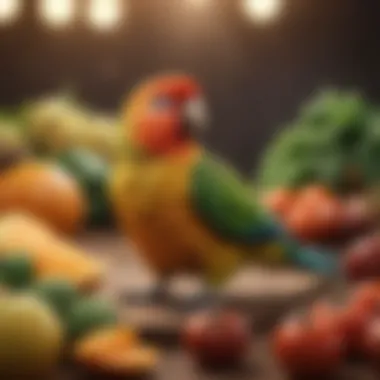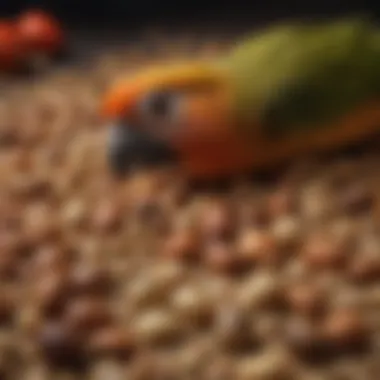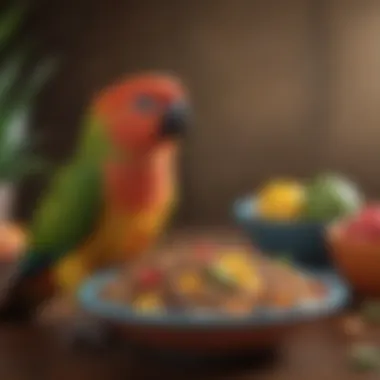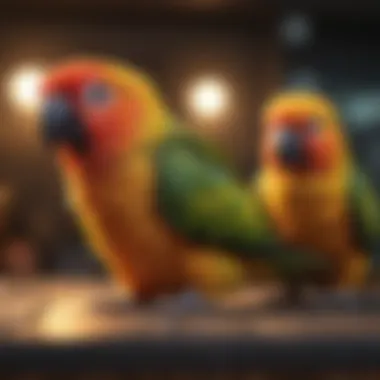Optimal Nutrition for Conures: Essential Foods Guide


Intro
Understanding the optimal nutrition for conures is vital for their longevity and overall well-being. These lively birds not only thrive on companionship but also require a well-balanced diet to support their health.
Pet owners often wonder what foods best suit conures, as their dietary needs can differ significantly from other avian species. This guide will dissect their nutritional requirements, preferred foods, and common dietary hazards. By addressing these factors, you can ensure that your conure remains vibrant and energetic.
Pet Care Essentials
Daily Nutrition Requirements
A conure's diet should encompass a variety of components to meet its daily nutritional needs. A balanced diet primarily consists of high-quality pellets, fresh fruits, and vegetables. Pellets should make up about 60-70% of their daily intake. They are formulated to provide essential vitamins and minerals that seeds alone may lack.
Fresh fruits and vegetables are a crucial part of a conure’s diet. Some excellent choices include:
- Apples (without seeds)
- Carrots
- Bell peppers
- Spinach
- Broccoli
It is advisable to introduce new foods gradually to avoid digestive issues. Watch your conure's reaction to these additions; some may prefer certain foods over others.
Exercise and Playtime
Conures are energetic birds that require regular exercise and playtime to maintain both physical and mental health. Allowing them time outside their cage is essential. Create a safe area for them to explore and engage with toys. A mix of climbing structures and interactive playtime helps in keeping them active. It also fosters social interaction.
Grooming Tips
Grooming plays a significant role in your conure’s health. Regular nail trimming is essential to prevent overgrowth that can cause discomfort. Bathing is another aspect; conures often enjoy splashing in shallow water. Providing misting or a shallow dish can ensure they stay clean and healthy.
Health and Wellness Check-ins
Regular health check-ups with a veterinarian specializing in avian species are crucial. Routine visits help catch any potential health issues early on. Observing your conure’s behavior at home can also signal changes that might require professional attention. For instance, a decline in appetite or altered vocalizations are signs that something may be wrong.
"A well-fed conure is a happy conure. They require variety in their diet to keep them stimulated and healthy."
Finale
Optimal nutrition for conures is more than just feeding them; it encompasses a holistic approach that includes daily nutrition requirements, exercise, grooming, and health check-ups. Understanding the nuances of their diet and care can result in a vibrant and healthy pet.
Understanding Conures
In order to provide optimal nutrition for conures, an understanding of these birds is essential. Knowing their specific needs, behavior, and what makes them unique helps pet owners make informed decisions. Conures are vibrant and social birds, often forming strong bonds with their human companions. Their lively personalities require mental stimulation, which is deeply influenced by their diet.
Defining Conures
Conures belong to a group of medium-sized parrots in the family Psittacidae. They are characterized by their long tails, bright colors, and playful demeanor. These birds typically have a strong social drive, needing interaction with their human caretakers. Their ability to mimic sounds adds to their charm, making them popular pets. However, caring for a conure goes beyond just providing companionship. It requires a firm grasp of their dietary needs to ensure their health and longevity.
Common Conure Species
When discussing conures, several species are particularly well-known. Each has its own unique traits that guide how best to care for them nutritionally.
Green-Cheeked Conure
Green-Cheeked Conures are smaller than some other conure species and are often favored for their playful nature and moderate size. They have a distinctive green body with a grayish crown and orange under the tail. These birds are generally calm and adapt well to their surroundings, making them excellent pets. Their playful demeanor encourages interactive feeding, such as foraging through fruits and vegetables, which supports both their nutrition and mental stimulation.
Sun Conure
Sun Conures are notable for their stunning colors, featuring bright yellow and orange plumage with hints of green on the wings. Their loud calls can be both a delight and a challenge. They are known for being highly social and require regular interaction. Their diet must include a variety of seeds, fruits, and vegetables to maintain good health, particularly considering their energetic nature. Providing the right nutrition not only supports their vibrant colors but also caters to their high activity levels.
Nanday Conure
Nanday Conures stand out due to their unique black facial markings and their mostly green body. They are often described as having a playful and affectionate personality. This species tends to bond closely with their owners, necessitating a diet rich in diverse nutrients to support their active lifestyle. Offering them a well-balanced diet helps maintain their health, ensuring they have the energy needed for both playful antics and social interactions.
Natural Habitat and Diet
The natural habitats of conures usually consist of forests and wooded areas in Central and South America. Here, they consume a variety of fruits, seeds, nuts, and flowers. Mimicking these dietary patterns can lead to healthier pets. Understanding their natural diet aids in composing a balanced meal plan that aligns with their instincts and nutritional needs.


Conures have diverse eating habits in the wild, which should be reflected in the diets provided by their owners. Incorporating a wide range of foods enhances not only nutritional value but also fulfills their instinct to forage for various tastes and textures, which is vital for their mental well-being.
Nutritional Requirements of Conures
Understanding the nutritional needs of conures is essential for their health and longevity. Proper nutrition not only supports physical well-being but also positively influences behavior and emotional health. Conures, being active and social creatures, require a balanced diet filled with essential nutrients.
A well-structured diet that meets their nutritional requirements prevents various health issues. These might include feather plucking, lethargy, and organ failure. Hence, focusing on the core elements of their diet is vital. This section will explain the essential nutrients conures need and the recommended daily caloric intake.
Essential Nutrients
Vitamins and Minerals
Vitamins and minerals are crucial for the overall health of conures. They play significant roles in various bodily functions, such as improving immune response and supporting bone health. Essential vitamins like Vitamin A, D3, and E contribute immensely to their well-being.
- Vitamin A is vital for vision and skin health.
- Vitamin D3 helps with calcium absorption, ensuring strong bones.
- Vitamin E provides antioxidant properties, aiding in cellular repair.
Minerals such as calcium and phosphorus are also necessary. Calcium strengthens bones and beaks, while phosphorus is essential for energy and cell formation. Conures can get these vitamins and minerals from fresh fruits and vegetables, seeds, and specially formulated pellets. However, an unbalanced intake can lead to deficiencies or toxicities, underlining the importance of proper dietary planning.
Proteins
Proteins are key components for muscle development, feather growth, and overall energy levels. They are made up of amino acids, which are the building blocks for a variety of body structures and functions. Sources of protein suitable for conures include legumes, nuts, and certain grains. Incorporating these into their diet supports a vibrant feather coat and active lifestyle. However, feeding too much protein can lead to kidney problems. Thus, moderation is crucial.
Fats
Fats often considered unhealthy in human diets, are actually important for conures in proper amounts. They provide essential fatty acids important for maintaining skin and feather condition. Fats are a concentrated energy source, supporting the high levels of activity typical in conures. Nuts and seeds are excellent sources.
However, it is vital to ensure fats do not dominate their diet. High-fat diets can lead to obesity and related health issues, like heart disease. Therefore, a careful balance is necessary.
Daily Caloric Intake
Determining the daily caloric requirement for a conure is critical for maintaining a healthy weight and avoiding obesity. Generally, conures need about 10-15% of their body weight in calories daily.
Factors that influence their caloric needs include age, weight, activity level, and overall health condition.
Regularly monitoring their weight and adjusting their caloric intake accordingly can help keep them healthy.
"Proper nutrition in conures not only enhances their quality of life but also prevents common health problems associated with dietary deficiencies."
Best Foods for Conures
Choosing the right foods for conures is critical. Proper nutrition affects their health, mood, and overall well-being. The right dietary choices can prevent health issues and contribute to a longer life. This section covers the best foods for conures, focusing on their nutritional benefits and practical considerations. By providing a diverse diet, owners can meet the specific needs of their birds while encouraging natural behaviors.
Seeds and Grains
Seeds and grains hold importance in a conure's diet. They provide essential oils and fatty acids. However, moderation is key, as they can be high in fat. Popular seeds include sunflower seeds and millet. Grains like oats offer fiber. A balance is needed to prevent obesity and other health issues. Mixing seeds with fresh foods can create a more rounded diet.
Fruits
Fruits offer hydration and essential vitamins. Conures usually enjoy a variety of flavors and textures in fruits. However, some should be given in moderation due to sugar content.
Apples
Apples are a popular choice for conures. They are rich in Vitamin C, which helps boost the immune system. The crisp texture makes it appealing to birds. However, the seeds should be removed because they can be toxic. Overall, apples are a safe, refreshing snack that most conures love.
Berries
Berries are another excellent fruit choice. They are low in calories and high in antioxidants. Blueberries and strawberries can enhance a conure's diet. The colors can also attract their attention. However, due to their acidity, it's best to offer these in small amounts to prevent digestive issues.
Bananas
Bananas are nutritious and easy to handle for conures. They provide potassium, which is important for muscle function and cardiovascular health. The creamy texture is often liked by many birds. However, bananas are high in sugar, so they should be limited to once or twice a week.
Vegetables


Vegetables should play a big part in a conure's diet as well. They provide necessary vitamins and minerals, promoting vitality and good health.
Carrots
Carrots are high in beta carotene, which is converted into Vitamin A. This vitamin is essential for vision and skin health. Many conures enjoy nibbling on raw carrots. They can also be offered cooked but without seasoning. However, too much can cause an imbalance, so variety is essential.
Leafy Greens
Leafy greens like spinach and kale are rich in vitamins A and K. They help in bone health and overall well-being. Offering a variety of greens ensures that your conure benefits from different nutrients. However, some greens contain oxalates and should not be fed in excess.
Bell Peppers
Bell peppers are colorful choices that provide Vitamin C and fiber. The crunchiness can stimulate a conure's interest. They come in various colors, each providing unique benefits. However, ensure they are washed and cut into manageable pieces before serving.
Commercial Pellets
Commercial pellets can complement a conure’s diet. They are designed to provide a balanced nutritional profile. Brands like Harrisons or Lafebers are reputable. Pellets reduce the chances of selective eating, which can occur with seeds alone. However, they should not replace fresh foods entirely. A combination of pellets and natural foods creates the best results.
Preparing a Balanced Diet
The significance of preparing a balanced diet for conures cannot be overstated. A well-structured diet not only fosters good health but is also crucial for maintaining the vibrancy of these lively birds. Conures, like all parrots, thrive on a combination of nutrients, and a balanced diet aids in the prevention of various health issues. It is essential to consider both the nutritional content and the proportions of different food types to ensure optimum health.
Portion Control
Portion control is a fundamental aspect of a balanced diet. Conures have unique metabolism rates and dietary preferences, which can vary widely among different species. Proper portioning of food can help keep your conures at a healthy weight, reduce the risk of obesity, and minimize the chances of nutritional deficiencies or imbalances. As a guideline, it is recommended that conures receive a mix of pellets, seeds, fruits, and vegetables in controlled portions.
Here are a few pointers on managing portions:
- Pellets: Typically, pellets should make up about 60-70% of the diet. Measure out approximately 1-2 tablespoons daily, depending on the size and activity level of your bird.
- Fresh Foods: Fruits and vegetables should account for around 20-30% of the diet. Some experts suggest offering a teaspoon or two of chopped foods daily.
- Seeds: While seeds can be a favorite, they should comprise only about 10% of the diet. Limit the quantity to avoid excess fat intake.
Monitoring your conure's weight and adapting portions accordingly can lead to a healthier, more active pet.
Diet Variety
Diet variety is key to ensuring that conures receive a well-rounded range of nutrients. Offering a diverse selection of foods not only keeps mealtime interesting for your bird but also helps to prevent boredom, which can lead to unwanted behaviors.
Different colors and types of fruit and vegetables can provide essential vitamins and minerals. Here are some benefits of incorporating variety into your conure's diet:
- Nutrient Richness: Various foods contribute different nutritional properties. For instance, leafy greens supply vitamins A and K, while bell peppers are rich in vitamin C.
- Taste Exploration: Allowing your conure to try new foods can encourage adventurous eating habits. Birds often enjoy several textures and flavors.
- Health Monitoring: Introducing new foods can aid in observing how your conure reacts to different nutrients, helping to identify possible allergies or discomfort.
To facilitate this, you might consider a rotating schedule of fresh fruits and vegetables, ensuring that your conure experiences the rich variety nature offers. This approach not only satisfies their taste but also caters to their complex nutritional requirements.
Remember: A balanced and varied diet is just as important for your conure as regular veterinary care. Regularly consult with your vet to ensure you are meeting all the dietary needs.
Foods to Avoid
Understanding what foods to avoid is essential in ensuring conures remain healthy and vibrant. Some foods can be toxic or harmful to their unique digestive systems. Avoiding these harmful foods is crucial to their overall well-being. It also helps prevent potentially dangerous health issues that can arise from a poor diet. Without attention to dietary hazards, pet owners risk jeopardizing their conures' health.
Toxic Foods
Avocado
Avocado is known for its creamy texture and nutritional benefits for humans, but it poses a significant risk to conures. The issue lies primarily in a substance called persin, which can be toxic to birds. Even a small amount of avocado can lead to symptoms such as respiratory distress, lethargy, or even death. Therefore, it is advisable to completely avoid avocado in their diet. Its inclusion is not only risky but unnecessary.
Caffeine
Caffeine is another substance that is harmful to conures. Found in coffee, tea, and some sodas, caffeine stimulates the nervous system. This can lead to increased heart rates and restlessness in birds. Even small amounts can be potent and distressing for these pets. Thus, it is advisable to keep all sources of caffeine far from their reach. Avoiding caffeine helps maintain their calm and balanced behavior.
Chocolate
Chocolate is a well-known toxin for many animals, and conures are no exception. The compounds theobromine and caffeine present in chocolate can be deadly for birds. Symptoms of chocolate ingestion include vomiting, increased heart rate, and even seizures. While chocolate might be a beloved treat for humans, it is best to strictly eliminate it from a conure's diet. The risks far outweigh any potential enjoyment.
High-Fat and Processed Foods


In addition to toxic substances, high-fat and processed foods can negatively impact conures' health. Such foods typically lack the essential nutrients that birds need. These include vitamins and minerals vital for their growth and metabolic processes. Feeding conures a diet high in fats can lead to obesity, liver disease, and other serious health problems. Bird owners should focus on providing natural, wholesome options instead of relying on processed snacks. Commercial human foods often contain ingredients unsuited for a bird's digestion.
Important Note: Always double-check that any food offered to conures is safe. Consult resources such as Wikipedia for detailed information on food safety for birds.
Hydration and Water Requirements
Hydration is a fundamental aspect of conure care that is often overlooked. Unlike other dietary components, the importance of clean water cannot be understated in ensuring the overall health of these lively birds. Proper hydration not only aids digestion but also plays a critical role in maintaining physiological processes. Dehydration can lead to serious health issues, making it imperative that pet owners understand their conure's water needs.
Importance of Clean Water
Clean water is essential for conures. Birds are susceptible to infections that can arise from contaminated water sources. Harmful bacteria and chemicals can enter their system and lead to diseases, significantly impacting their health. It is advised that pet owners provide fresh water daily, changing it as needed throughout the day to prevent bacterial growth.
Additionally, providing filtered or dechlorinated water can reduce the risk of introducing harmful substances. It's not just about offering water; the quality matters immensely. A conure's daily intake of clean, uncontaminated water supports their metabolism, helps in thermoregulation, and aids in the proper functioning of their organs.
"Water is life. For conures, it is essential for a life well-lived."
How Much Water Do They Need?
Understanding how much water a conure needs is essential for their welfare. Generally, a conure will consume between 30 to 50 milliliters of water per day, but this can vary depending on several factors.
- Age: Young, growing birds may require more water compared to adults.
- Diet: A diet high in dry foods will necessitate more water, whereas fruits and vegetables provide some hydration.
- Environment: Warmer climates may lead to increased water consumption due to evaporation and heat.
Monitoring your conure's water intake is easy. Observe how quickly they finish their water supply. If they are finishing it too quickly, provide more to ensure they stay hydrated.
Monitoring Health and Dietary Changes
Monitoring the health of a conure is crucial for ensuring its well-being. Observing dietary changes plays a significant role in this process. When pet owners understand what constitutes a healthy diet, they can better assess their birds’ nutrition and make any necessary changes. An ideal, well-balanced diet not only promotes vitality but may also prevent various health issues.
Regularly checking a conure’s eating habits makes it easier to catch any signs of distress or illness. Since conures can be susceptible to nutritional deficiencies, being attentive to their food intake aids in detecting problems before they escalate. This involves noting how much they eat, their willingness to try new foods, and any preferences they may show. Additionally, maintaining a variety of food items, including seeds, fruits, and vegetables, keeps meals interesting and ensures a broad range of nutrients.
Signs of Nutritional Deficiencies
It is essential to recognize the indicators of nutritional deficiencies in conures, as these signs can manifest in various ways. If a conure lacks certain nutrients, several behavioral or physical symptoms may emerge, including:
- Feather plucking or dull feathers: This can indicate insufficient protein or essential fatty acids in their diet.
- Lethargy: A lack of energy could be linked to inadequate caloric intake or poor nutritional choices.
- Changes in droppings: Unhealthy droppings may suggest dietary imbalances, which require immediate attention.
- Weight loss or gain: Sudden shifts in weight can be a strong indicator that their diet needs adjustment.
Being aware of these symptoms allows pet owners to respond quickly. Noticing changes early can lead to better health outcomes for the conure. If deficiencies are suspected, consult with a veterinarian for guidance on dietary adjustments.
Adjusting Diet Based on Age and Activity
A conure’s dietary needs evolve throughout its life. Young conures may require different nutrients compared to older birds. They may also have different energetic needs based on their activity levels. High-energy conures, such as those that exercise frequently or engage in interactive play, require more calories to maintain their rigorous lifestyle.
Owners should assess the age, health, and activity level of their conures regularly.
In younger birds, protein-rich options, like cooked beans or chickpeas, might be emphasized to support growth. Conversely, as conures age, weigh the need to focus more on fiber to support digestion and overall health. Additionally, engaging an experienced veterinarian for tailored advice is invaluable. This adaptation is part of fostering a long and healthy life for the conure.
Consulting with a Veterinarian
Consulting with a veterinarian is crucial for maintaining the optimal health of conures. Their specialized knowledge about avian species can provide conure owners with valuable insights into nutrition, disease prevention, and overall care. Like all pets, conures require more than just basic feeding; they need a balanced diet tailored to their specific needs and situations. Regular consultations can help identify any health issues early on, ensuring timely interventions that can significantly improve a conure’s quality of life.
One of the benefits of consulting with a veterinarian is the opportunity for routine health check-ups. These visits allow for the monitoring of a conure's growth, weight, and overall health status. During these check-ups, the vet may perform physical examinations, assess the bird's diet, and recommend necessary changes to improve nutritional intake. Maintaining communication with your vet also enables you to discuss any observed changes in behavior or appetite that could indicate health problems.
Regular vet visits not only help with prevention but can also enhance the longevity of conures.
Routine Check-Ups
Routine check-ups are important for every conure. These appointments typically occur once a year, or more frequently if any health concerns arise. During these visits, a veterinarian may:
- Assess the overall health of the conure, including weight, feather condition, and beak health.
- Check for signs of common illnesses that might affect appetite and energy levels.
- Provide recommendations regarding possible dietary modifications that could benefit your conure.
- Discuss vaccination needs based on local regulations and health standards.
Performing these check-ups ensures the conure’s nutritional needs are being met. If any deficiencies or excesses are identified, the vet can guide adjustments to the diet.
Special Dietary Needs
Conures, like many other animals, may develop special dietary needs based on their age, health condition, and activity level. For example, younger birds might require more protein for growth and development, whereas older conures may need diets that support their joint health. Some conures suffer from obesity due to overfeeding or unhealthy food choices, necessitating a tailored diet plan to manage their weight. Special cases might include:
- Elderly conures needing softer foods for easier consumption.
- Conures with specific health issues, such as liver problems, requiring lower-fat diets.
- Birds undergoing recovery from illness that may need high-nutrient foods to regain strength.
A consultation with a veterinarian can illuminate these needs and help design a diet plan that aligns with the pet's health status. Keeping in mind these specialized considerations will enhance not just the conure's dietary standards, but overall health and well-being.







